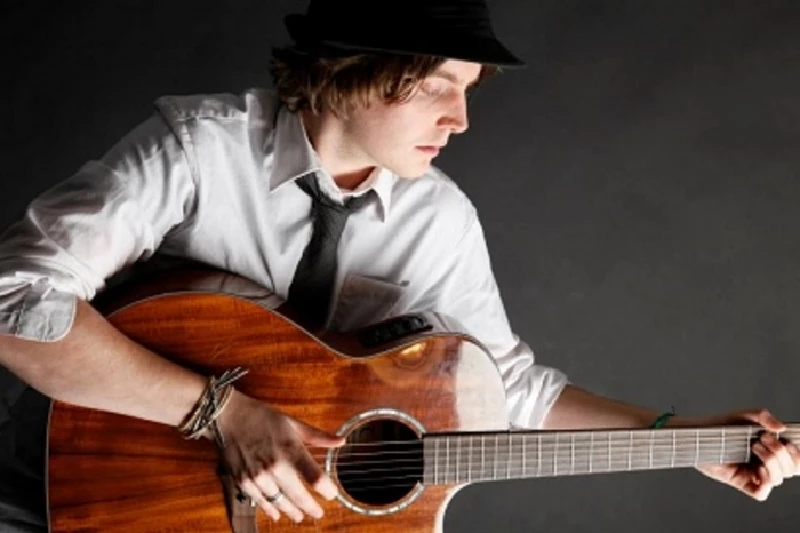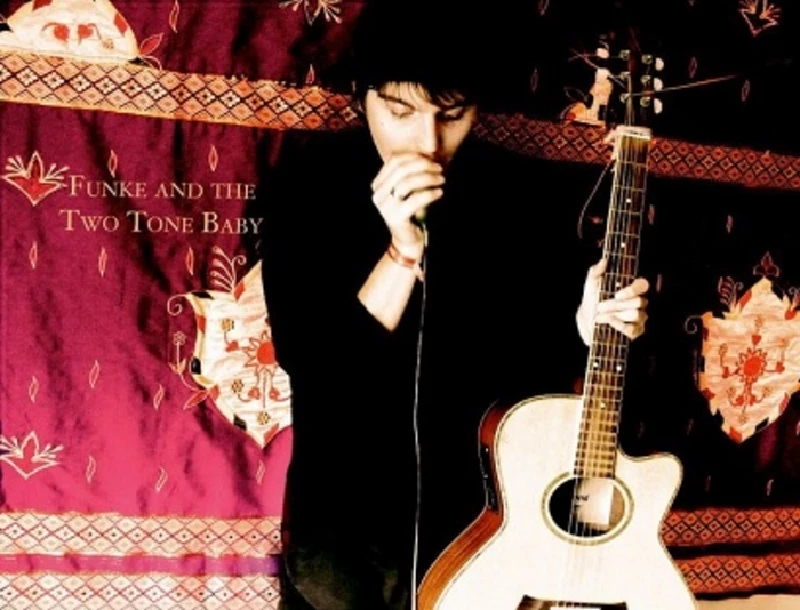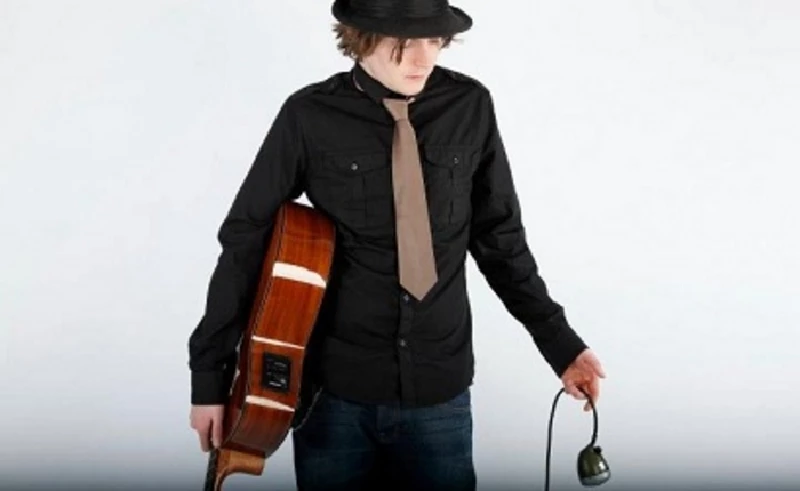Funke and the Two-Time Baby - Interview
by Jamie Rowland
published: 24 / 7 / 2012

intro
Jamie Rowland chats to Medway-based singer-songwriter Daniel Turnbull about his one-man alt-blues band Funke and the Two-Tone Baby and his recording career to date
Kent’s Funke and the Two-Tone Baby is a one-man alt-blues band made up of overlayed and looped guitars, stomp box, harmonica and a number of different mics, all wrangled and controlled by one Daniel Turnbull. His live sets are an entertaining mix of original material and covers of songs like ‘Fever’, Fatboy Slim’s ‘Praise You’ or any number of songs that will provoke a sing-a-long from the audience. This year he released a new EP, 'Injustice and Queen', and has been racking up gig after gig, with enough shows now booked to take him into the new year. We met up with Funke (or Dan, if you prefer) for a pint of ale and a chat about his formative musical years, his upcoming album and the way technology drives his compositions. PB: How long has Funke and the Two-Tone Baby been going? Funke: I have been Funke and the Two-Tone Baby for about five years. I acquired the loop pedal and then the name. I’ve always created music, and it was just something to do; to make music. Then I went to university and wrote some more songs and got a bit more confident with what I did. I just started out with a guitar and a loop pedal, and then I expanded into mics and stomp boxes and harmonicas – the set-up I’ve got now. I was performing at uni and doing open mic nights, band nights. And then after my second year I got my first paid gig and got my hour and a half set together – and it was not very good! Then I got another paid gig, improved my set and started looking for more. I carried on doing open mic nights and looking for more gigs, and then people started coming to me. I started getting phone calls and emails from people and my job became easier. PB: You recently moved to the Medway area; what brought you there? F: It’s closer to London. My girlfriend works for PPL (Phonographic Performance Limited) so she commutes everyday. And I got sick of living like a student. I was in a student house so it was always a shithole. We were trying to form a professional life. My girlfriend got a very good job,and I started gigging enough that we could afford to get a nice flat and start a human life. It got to a point in the last few months of university where I felt that university was kind of encroaching on my career a bit. I was having to turn down gigs because I had a dissertation to write. And the second I finished my dissertation, I got on the phone and the internet and just booked solidly, you know? PB: And you are now self-employed as a professional musician? F: I am. I have my own paper and everything! PB: And do you manage yourself as well? F: My girlfriend, she is my manager-come-advisor. Because she has studied the music business side, and she works for PPL so her head’s screwed in the right place. And I’m not particularly good on the business side, so when I go “err what’s this?” then she can advise me. And also I have one of the old lecturers on the business course, who works for BASCA (British Association of Songwriters, Composers and Artists) so her address book is quite incredible, and she’s helping me a lot. She has given me a lot of help; she asked me to send her ten CDs to send to publishers and journalists and people. Because she knows people. I was signed to the university record label, and I made an EP. Then the business group and the teacher were assigned to me, which is how I met my girlfriend. And they got their mark based on what they did for me. PB: So you were essentially given free representation? F: Yeah. Because their job was, they were assigned to find all the radio people they could and send them things, and all the promoters and journalists and venues. We got Record of the Week on a lot of websites and my video got everywhere. I’d go back to the group every week and say,“So what have you got this week?” They would just reel off all these things. I could do a google search on myself and find me on websites in Iceland and getting 5 star reviews. But the disadvantage of that is that when I released the last EP on my own I couldn’t do all of that. So while it got the exposure and we went back to the people who had given us a review that last time, we couldn’t really expand on it so it plateau’d very early. PB: Were you always playing in bands growing up? F: Yeah, always. Since I was 15. I had a very good friend, and the Christmas I got an electric guitar he got a drum kit. We forced our other friend into getting a bass guitar and we formed a three-piece. Then we got another mate in to play guitar, and then a girl in to sing. And we did local Battle of the Bands and little gigs in parks. Nothing major at all; we were just kids playing covers – badly! Then I went to university and met some more people. We were in a band called te Heroic Dose, and that was great; that was when my love really took a hold. PB: A lot of the music you’re making now is very blues influenced; were you always playing that kind of style? F: We did the whole Nirvana thing, and bands to that extent. A lot of my mates went down the Metallica road, and I kind of stuck to more... I know what I like, and I always have. I started playing a lot of Nirvana and stuff in that vein; Sonic Youth and stuff like that. And in the Heroic Dose, we started doing a bit more of a psychedelic thing. And then when they left I started playing more on my own and just started playing the blues. It wasn’t really a conscious decision. It was just whenever I played on my own that is what I played. That’s what came out of me. But my musical passion, I really love electronic music. People say to me, “Oh you’re a blues musician; so what blues music do you like?” And I’m likem “Well...not a huge amount really!” The music that comes out when I pick up a guitar and the music I listen to are so polar opposite, but I like to think I can kind of combine them. I have the blues roots in there, but with almost electronic beats. That’s what I think a lot of people don’t get. When I play, they want a verse, a chorus, a bridge and all those different parts. My music – the same as electronic music – is more about the parts and how they interact with each other. So what you have at the start - once you put everything else on top of it - that bit at the start will have a completely different meaning by the end of the song. I’m doing this thing at the moment; it’s a really lovely, jangly guitar bit, and then it’s got this filthy bass line and beat that come over it. It’s the juxtaposition. The jangly thing on its own; I could make a lovely, folky little song with that, but then once I put the bass line over it just changes the whole essence of this riff. And there are things you can do with a loop pedal that you can’t necessarily do with a band, unless you have about eight guitarists. You put eight-part harmonies over it and you kind of build lovely textures within the music that you can’t do with a band. I wrote my dissertation on loop pedals, and I took one of my songs and I got a ten-piece band and made them play each part as if they were a loop pedal – so a guy would play the same chord completely static, as if it were on a loop pedal – and it completely lost a lot of the feel. Because with a band, the thing that makes bands good is that it’s not static; you put more feeling into it and all the members are doing different things, but in creative harmony. It just doesn’t work if you do it with a band. There’s a lot of theory towards it, which I never knew until I started doing it professionally. It’s also the arrangements. A lot of my songs, the big finale, the big crescendo at the end is when all the parts come together. And you can’t really have a drummer sitting on stage, not doing anything until the last minute and then going “doosh” and it ends. You’d have to change the arrangements; the music is limited by the technology, but then technology also creates the arrangements and the songs come up and are shaped by the equipment I’m using. PB: Your live set includes some very interesting and eclectic covers. How do you choose what songs you want to play? F: A lot of the time I just do tracks I think I can add something different. I feel almost a bit bad doing it, but sometimes you’ll hear a track and think, “That is brilliant! But it would be so improved with a drum beat or a bass line or something.” And I cover it and put that in. Did you hear that Barry Louis Polisar song I did; ‘All I Want is You’? It was on the 'Juno' soundtrack. It’s just an acoustic guitar and a harmonica thing; I listened to that and then I put a beat over it, and it’s just opened the whole thing up. There’s hundreds of covers of this track, but I’m the first one I’ve seen to put a kind of a beat on it, and it just gives it some drive. That’s what I do to my covers. PB: I know you’re booked up with gigs for the rest of the year; are you also planning on recording some new material? F: Yes! Dunno what it’s going to be called, but I’m planning to record my album in about October. I have six or seven tracks that I think are strong enough to record. I want to write aboutthree or four more, and then that will be the album. Hopefully, by the time I record in October, I will have done the whole summer’s worth of gigging and then it’ll be ready for a Christmas release. I think I’m writing some very strong stuff at the moment. I’ve been doing what I do; people think I’m bluesy because it’s the easiest place to put me. But people have been saying, “You make [the blues] more electronic”. And I was kind of like, “Oh yeah!” It’s something I never realised, but I did it. It was something kind of subconscious. People tell me that I do that, and I’ve taken that more on board. It’s a strange thing to play music and not really know what you’re doing. People pigeon-holed me in blues and I thought right then I’ll be a blues act because that’s doing well. And now it’s got to the point where I can think for myself more. I was so worried about making a living from it, and getting enough money and trying to be the person that people wanted me to be. Whereas now people are enjoying my music for me, so I can write the stuff that I want to write. PB: Thank you.
Picture Gallery:-


most viewed articles
current edition
Carl Ewens - David Bowie 1964 to 1982 On Track: Every Album, Every SongArmory Show - Interview with Richard Jobson
John McKay - Interview
Colin Blunstone - Thalia Hall, Chicago, 16/7/2025
Bathers - Photoscapes 1
Loft - Interview
Visor Fest - Valencia, Spain, 26/9/2025...27/9/2025
Billie Eilish - O2 Arena, London, 10/7/2025
Sir Tim Rice - Interview
Robert Forster - Interview
previous editions
Heavenly - P.U.N.K. Girl EPManic Street Preachers - (Gig of a Lifetime) Millennium Stadium, Cardiff, December 1999
Peter Perrett - In Dreams Begin Responsibilities Interview Part One
Beautiful South - Ten Songs That Made Me Love...
Boomtown Rats - Ten Songs That Made Me Love....
Coldplay - Wembley Arena. London, 16/8/2022
Prolapse - Interview
Oasis - Oasis, Earl's Court, London, 1995
Trudie Myerscough-Harris - Interview
Pixies - Ten Songs That Made Me Love...
most viewed reviews
current edition
Davey Woodward - Mumbo in the JumboSuzanne Vega - Flying With Angels
Nigel Stonier - Wolf Notes
Vinny Peculiar - Things Too Long Left Unsaid
Philip Jeays - Victoria
Lapsley - I'm a Hurricane, I'm a Woman In Love
Billy Nomates - Metalhorse
Taylor Austin Dye - Sick of Me
Morcheeba - Escape The Chaos
HAIM - I Quit
Pennyblackmusic Regular Contributors
Adrian Janes
Amanda J. Window
Andrew Twambley
Anthony Dhanendran
Benjamin Howarth
Cila Warncke
Daniel Cressey
Darren Aston
Dastardly
Dave Goodwin
Denzil Watson
Dominic B. Simpson
Eoghan Lyng
Fiona Hutchings
Harry Sherriff
Helen Tipping
Jamie Rowland
John Clarkson
Julie Cruickshank
Kimberly Bright
Lisa Torem
Maarten Schiethart